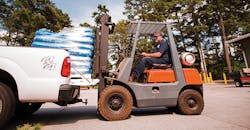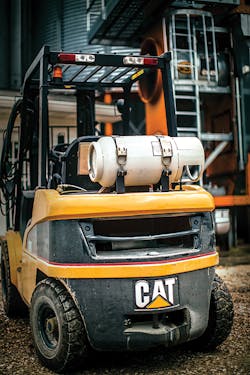3 Ways This Forklift Fuel May Surprise You
One could argue that material handling equipment is the backbone of any productive facility or business operation. By choosing the right forklift and fuel, material handling professionals can ensure efficient, reliable operation.
When exploring their fuel options, many material handling professionals are finding propane to be the most versatile, cost-effective, and environmentally-friendly option. In fact, 90% of Class 4 and 5 forklifts run on propane, according to data from the Propane Education & Research Council.
While propane is an established fuel in the material handling market, there are still some common misconceptions regarding the fuel’s capabilities. Here are three ways this forklift fuel may surprise some professionals:
1. Propane forklifts work anywhere, anytime.
No matter the job or location, propane forklifts provide powerful, reliable performance for a wide variety of material handling operations. Electric forklifts can’t carry the weight of large jobs and diesel isn’t fit for small tasks, but propane forklifts are available in all weight classes to match the job at hand.
Plus, propane’s versatile, low-emission operation makes it a great fit for indoor use. According to a survey conducted by PERC, 68% of forklift fleets are required to work both indoors and outdoors. Propane-powered forklifts enable operators to safely work indoors and out, keeping them more productive throughout the workday.
Further, propane provides 100% power throughout the operation and one propane cylinder typically lasts an entire eight-hour shift, so facilities and warehouses can enjoy uninterrupted operational capacity. Plus, employees won’t have to worry about downtime for recharging. Electric forklifts, on the other hand, require hours of recharging and strict battery management.
2. Propane can save more than other fuel options.
When you do the math on the long-term costs of forklift fuel options, propane takes top billing in a lot of ways. Propane-powered forklifts consistently cost less than other fuels, like electric and diesel, providing cost savings throughout ownership to businesses operating on propane.
According to data from PERC, the capital costs of propane forklifts are almost 30% lower than electric. Unlike their propane counterparts, electric forklifts incur additional utility costs to keep them charged. Electric forklifts’ battery life and power output diminishes over time and can lead to future costs, including additional expensive batteries. Charging electric forklift batteries when the remaining charge is too high or too low can significantly reduce the battery’s lifespan, too. The life expectancy of a propane cylinder, in contrast, is three times longer than an electric forklift battery and oftentimes extends beyond the typical lifespan of a forklift. Propane-powered forklifts can also be refilled at any time without impacting the lifespan of the cylinder.
With propane, beyond the initial equipment purchase and the cost of fuel, all that facility managers and business owners are responsible for is maintenance and storing the cylinders, which they can either purchase or lease from their propane supplier. Business owners may also be able to lock in a fuel price with their local propane supplier, providing more financial peace of mind.
3. Propane is a better low-emissions forklift fuel than its electric and diesel counterparts.
Propane is the best choice for businesses interested in operating with fewer emissions. A comparative emissions analysis of forklifts conducted by the Gas Technology Institute, in partnership with PERC, found that propane forklifts produce significantly fewer emissions than other fuel sources.
For example, propane can reduce SOx emissions by 76% when compared with electric. While it’s true that electric forklifts produce zero emissions during normal operation, their site-to-source emissions profile isn’t as sterling. Site-to-source emissions for electric forklifts include the emissions caused by electric generation and its transmission to the final point of use. Facilities also need to consider the emissions produced during battery production and their transportation.
The battery disposal process can be a dirty one, too. Once an electric forklift battery goes dead, facility managers can’t dispose of them without negatively impacting the environment. The Environmental Protection Agency considers them to be a hazardous material, so they have specific handling and disposal regulations attached. And in many cases, proper disposal or reconditioning of the battery can be a costly proposition. Plus, propane is much cleaner than diesel, which produces toxic exhaust that makes it unsafe to operate indoors.
Propane continues to be a popular fuel choice with material handling professionals. The fuel’s ability to work around the clock and reduce emissions, all while keeping costs in check, are a few reasons that more and more business owners count on propane forklifts to get the job done.
Visit Propane.com/Forklifts to learn more about the benefits of propane forklifts.
Jeremy Wishart is the director of off-road business development for the Propane Education & Research Council. He can be reached at [email protected].
About the Author


